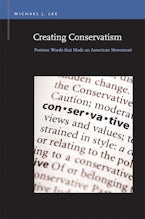Creating Conservatism charts the vital role of canonical post–World War II (1945–1964) books in generating, guiding, and sustaining conservatism as a political force in the United States. Dedicated conservatives have argued for decades that the conservative movement was a product of print, rather than a march, a protest, or a pivotal moment of persecution. The Road to Serfdom, Ideas Have Consequences, Witness, The Conservative Mind, God and Man at Yale, The Conscience of a Conservative, and other mid-century texts became influential not only among conservative office-holders, office-seekers, and well-heeled donors but also at dinner tables, school board meetings, and neighborhood reading groups. These books are remarkable both because they enumerated conservative political positions and because their memorable language demonstrated how to take those positions—functioning, in essence, as debate handbooks. Taking an expansive approach, the author documents the wide influence of the conservative canon on traditionalist and libertarian conservatives. By exploring the varied uses to which each founding text has been put from the Cold War to the culture wars, Creating Conservatism generates original insights about the struggle over what it means to think and speak conservatively in America.
ContentsAcknowledgmentsPrologue. The Old Argument Comes Full CircleChapter One. The Conservative Canon and Its UsesChapter Two. The Traditionalist DialectChapter Three. The Libertarian DialectChapter Four. Fusionism as Philosophy and Rhetorical PracticeChapter Five. WFBChapter Six. Whittaker Chambers’s MartyrdomChapter Seven. Conservatism and CanonicityNotesSelected BibliographyIndex

